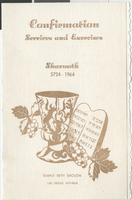Search the Special Collections and Archives Portal
Search Results
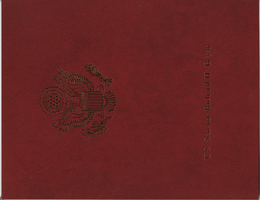

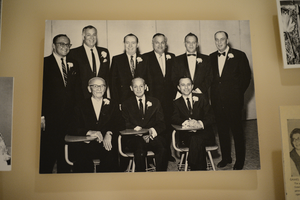
Photograph of past presidents of Temple Beth Sholom, approximately 1978
Description
Standing, left to right: Mel Moss, Jack Entratter, Harry Wallenstein, Al Goot, David Zenoff, Jerry Mack. Seated, left to right: Nate Mack, Mike Gordon, Lloyd Katz.
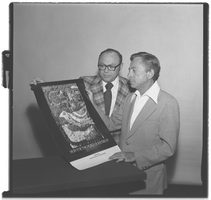
Photographs of Combined Jewish Appeal members holding a poster, July 05, 1977
Date
Archival Collection
Description
Various photographs of Lloyd Katz (right) and an unidentified man holding a poster that reads: "Pray for the peace of Jerusalem. We are one around the corner of the world." 120mm negatives.
Image
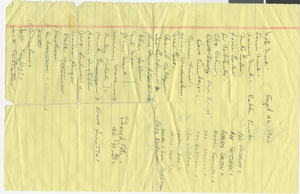
Handwritten list of names of Jewish people living in Las Vegas in the 1940s
Date
Archival Collection
Description
This list was written by Charles Salton, brother of Adele Baratz. Salton lists the names of Jewish people living in Las Vegas in the 1940s. The list is dated September 26, 1946.
Text
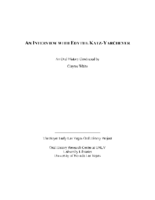
Transcript of interviews with Edythe Katz-Yarchever by Claytee White, 2000-2005
Date
Archival Collection
Description
Transcript of interviews with Edythe Katz-Yarchever by Claytee White over the course of several sessions in 2000, 2003 and 2005. In the interviews, Katz-Yarchever discusses her life in Las Vegas, owning theaters with her husband, Lloyd Katz, and the strides they made in civil rights. She talks about her service in Civil Defense and the National Guard, and moving to various places, then working in California and meeting her husband, Lloyd. The Katzes became involved in the community in various ways with Operation Independence and Holocaust education. About a decade after Lloyd's death, Edythe married Judge Gilbert Yarchever.
Edythe Katz-Yarvhever was born in Boston, a second generation American whose grandparents left Russia the century before. Edythe completed finishing school at the start of World War II and worked various jobs at home before joining the Civil Defense, and later, the National Guard. She moved to Maryland and got a job as a secretary at Edgewood Arsenal, then transferred to Cushing General Hospital to assist a Marine Corps neurologist, who was also a Jewish refugee. Towards the end of the war, she is transferred to an Army hospital in Hawaii, and thus began the rest of her life on the West Coast. When the war ended, Edythe sailed to California and worked various jobs in Los Angeles: in the secretarial pool at MGM Studios, for a casting agency and for a hotel magazine. Edythe met Lloyd Katz in San Francisco, and the two were married after a short courtship. The couple lived in San Francisco before moving to Las Vegas in 1951, where they took over the management of the Huntridge, Palace and Fremont theaters, then leased by Edythe's parents. The Katzes took a stand to desegregate their theaters, allowing black customers to sit with white patrons. Edythe and Lloyd became active in the city's Civil Rights Movement, including work with Operation Independence and the NAACP. Edythe started organizations like Volunteers for Education and Junior Art League, and directed an interfaith, interracial preschool. Lloyd would frequently open up their theaters to organizations to hold fundraisers, free-of-charge. Edythe was extremely active in the local Jewish community, including opening the city's first Jewish gift shop, serving as sisterhood president at her synagogue and starting the Jewish Reporter. She later founded a library for Holocaust education as well as assisted the school district's development of curriculum and teacher training relating to the Holocaust. Lloyd Katz passed away in 1986, and in 1995, Edythe married Gilbert Yarchever. Edythe and Lloyd's community service work was honored with the naming of their school, the Edythe and Lloyd Katz Elementary School, where Edythe still remains active.
Text
Sean Clark Collection of Las Vegas Entertainment Ephemera
Identifier
Abstract
The Sean Clark Collection of Las Vegas Entertainment Ephemera (approximately 1940-2004) contains a variety of material relating to different eras of Las Vegas, Nevada entertainment. Included in the collection are newspapers about the 2004 re-release of Howard Hughes' "Two Arabian Nights" film, and draft articles about 1960s entertainment leaders Jack Entratter and George Sidney. Also included in the collection are original photographs of Corinne Sidney with Jack Entratter and others in the 1960s, and Sidney's father's political advertisements that show her as a young girl. A newspaper clipping about Edthye and Lloyd Katz, a 1979 ShoWest award to the couple, and a Huntridge Theater poster document the couple's work in the entertainment industry in the 1960s and 1970s.
Archival Collection
Edythe Katz-Yarchever oral history interview
Identifier
Abstract
Oral history interview with Edythe Katz-Yarchever conducted by David Schwartz in 2006 for the UNLV University Libraries Oral History Collection. In this interview, Katz-Yarchever discusses 1960s Las Vegas, Nevada, the opening of the Caesar's Palace Hotel and Casino, Nate Jacobson, and William "Billy" Weinberger and his wife Jean. She also talks about Jake Freedman, president of the Sands Hotel and Casino. She also spends time talking about race relations and discrimination in Las Vegas businesses and community, the Westside, and the three movie theatres she and her husband, Lloyd Katz, owned in the city.
Archival Collection
Edythe Katz-Yarchever oral history interview
Identifier
Abstract
Oral history interview with Edythe Katz-Yarchever conducted by Claytee White on December 09, 2000, February 11, 2003, March 11, 2003, and December 06, 2005 for the Boyer Early Las Vegas History Project. In the interviews, Katz-Yarchever discusses her life in Las Vegas, Nevada, owning movie theaters with her husband, Lloyd Katz, and the strides they made in civil rights. She talks about her service in Civil Defense and the National Guard, moving to various places, and working in Los Angeles, California. She also discusses becoming involved in the community in various ways with Operation Independence and Holocaust education.
Archival Collection

